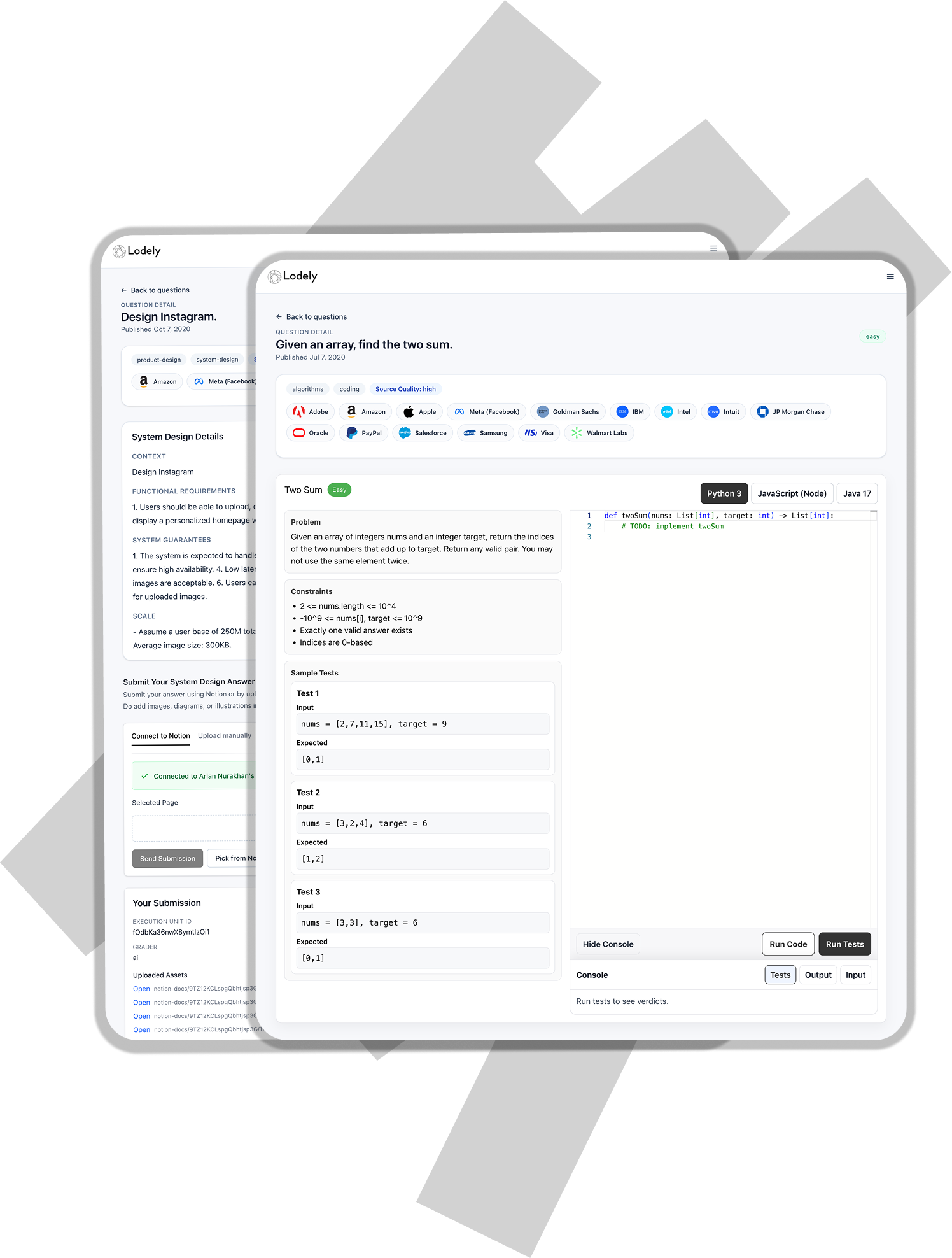Which Career Is Better: ML or Software Engineering
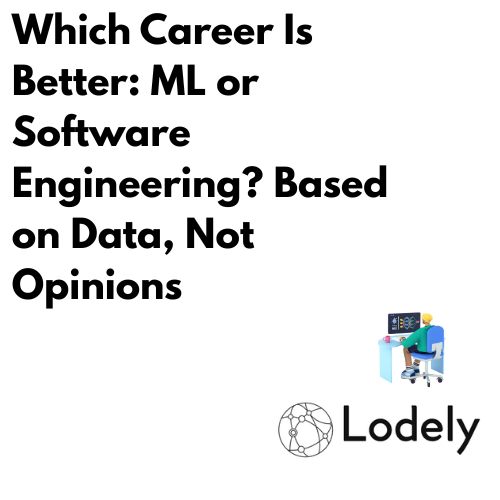
Which Career Is Better: ML or Software Engineering? Based on Data, Not Opinions
One path has you shipping production code fast. The other? Tuning models that might never see daylight. Figuring out which career is better: ML or software engineering, isn’t about chasing trends - it’s about knowing what kind of work fits your strengths, speed, and risk tolerance.
I've broken down both roles based on what really matters so you can make the smartest long-term call.
ML vs Software Engineering - The Real Numbers You Need to Know
I've seen friends go both routes in tech. The question of ML vs Software Engineering isn't just about passion - it's about cold, hard market realities. And after digging through the latest data, I can tell you exactly which path makes more sense for your situation.
The Honest Truth About Both Career Paths
Here's the deal - both paths can make you wealthy, but they play completely different games. Think of it like this: Software Engineering is like buying index funds (steady, reliable, predictable), while ML is like investing in growth stocks (higher potential, more volatile, requires more expertise).
Let me break down the numbers that matter:
Software Engineering Dominates in Four Key Areas
When it comes to stability and accessibility, software engineering wins across multiple critical factors.
1. Job Availability - The Numbers Don't Lie
Software engineering creates around 140,000 annual job openings according to the Bureau of Labor Statistics. Meanwhile, ML engineering sees 35% growth in postings but still represents only about 5% of all engineering job postings. That's a massive difference in opportunity volume.
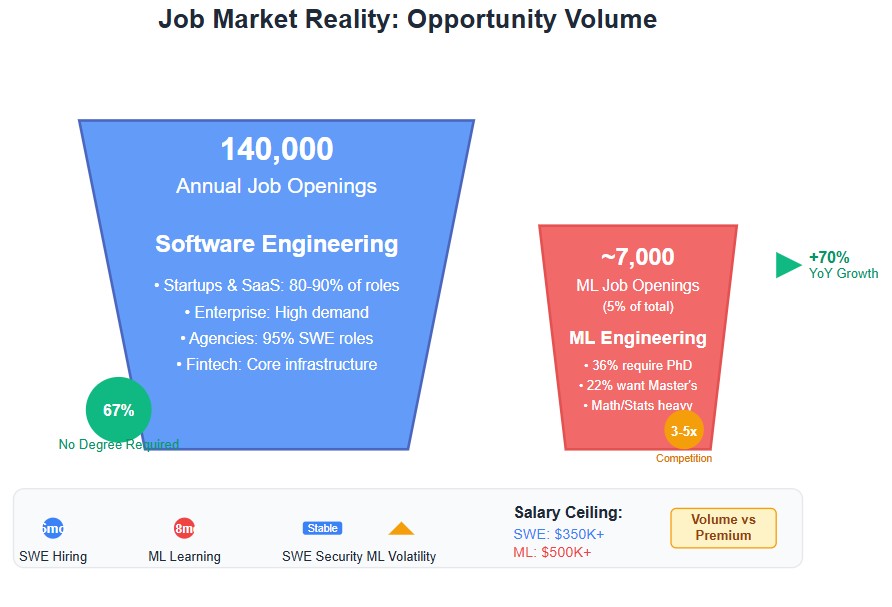
2. Entry Barriers - Much Lower Requirements
Here's something that shocked me when I first learned it: 67% of software engineering jobs don't require degrees, compared to ML roles, where 36% still require PhDs and another 22% want master's degrees. If you're trying to break into tech without a fancy degree, software engineering is your clear path forward.
3. Salary Predictability - Steady and Reliable
Software engineers median at around $133,080 with consistent ranges across companies. You won't get surprised by wild salary swings, and you can actually plan your financial future with confidence.
4. Career Longevity - Proven Track Record
Most software engineers I know have been doing this for 15-25 years without major pivots. The fundamentals evolve slowly, giving you decades of career stability.
ML Engineering Excels in Growth and Upside Potential
But here's where it gets interesting for the ML side. The potential rewards are significantly higher if you can handle the requirements.
1. Salary Ceiling - Absolutely Insane Numbers
The top 10% of ML engineers are pulling $240K+ annually according to Glassdoor, with senior ML engineers averaging $207,653. I've personally seen ML folks at big tech companies with total comp packages hitting $600K-$800K when you factor in stock appreciation. That's wealth-building territory.
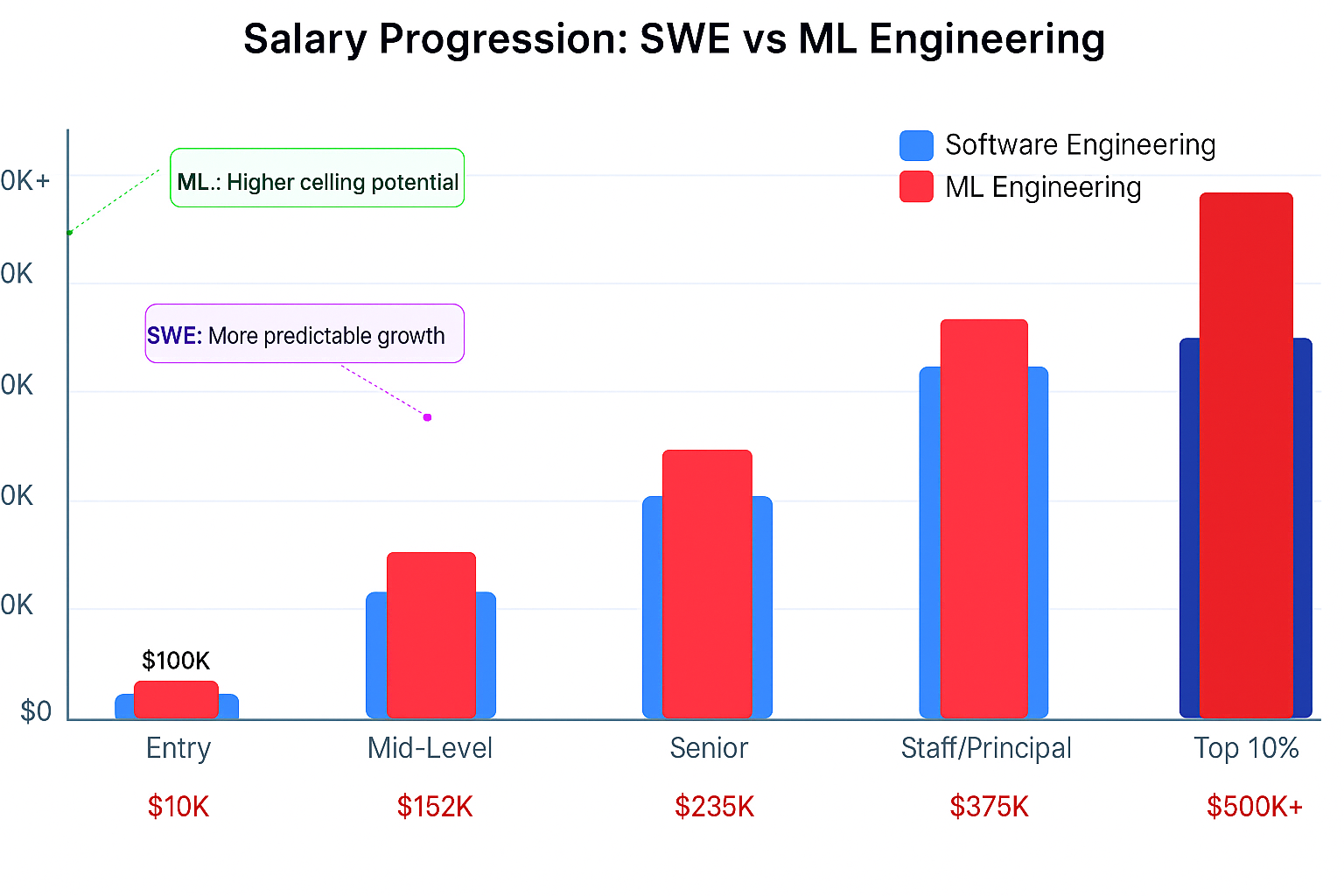
2. Growth Rate - Rocket Ship Industry
Job openings for ML engineers grew 70% year-over-year. The World Economic Forum projects 40% growth (1 million jobs) from 2023-2027. This is the kind of growth that creates career-defining opportunities.
3. Remote Work - Better Life Flexibility
78% of ML positions offer remote work compared to around 45% for traditional software engineering roles. This flexibility matters more than people think for the overall quality of life.
4. Stock Options - Life-Changing Money
Average ML engineer total compensation, including stock at top companies, can reach $220K-$323K vs around $180K-$250K for software engineers. When you're at a high-growth AI company, this difference can literally be generational wealth.
My Recommendation Based on the Data
After analyzing all these factors, here's how I'd approach this decision:
Choose Software Engineering if:
- You want to get hired within 6 months
- You don't have (or want to get) advanced degrees
- You value predictable income over maximum upside
- You prefer building systems over research-heavy work
- You want a 20+ year career path that's proven
Choose ML Engineering if:
- You can invest 18+ months learning before expecting results
- You have a strong math/stats background (or are willing to get it)
- You're comfortable with higher risk for higher reward
- You get excited by cutting-edge problems and research
- You want to ride the AI wave for maximum financial upside
What I'd Do Starting Over
Honestly? If I were 22 again, I’d probably start with software engineering to get my foot in the door, then transition to ML after 2–3 years.
That path gives you the best of both worlds - you learn software engineering fundamentals (which ML engineers need anyway), you start earning good money immediately, and then you can make the ML transition with real industry experience. Or, if I wanted to shortcut that entire path, I’d talk to a career coach engineering who’s helped people walk both roads and knows where the detours are.
tldr: Software Engineering wins on stability and ease of entry. ML wins on growth potential and maximum earning power. Neither choice is wrong - it's about matching your risk tolerance and timeline to the right opportunity.
Your Daily Reality Check: What You'll Be Doing Every Single Day
Here's what nobody tells you when you're choosing between ML and software engineering - the day-to-day work is completely different. I've worked with both types of engineers, and honestly, the difference in daily activities is night and day.
Let me break down what you'll be doing once you land that job.
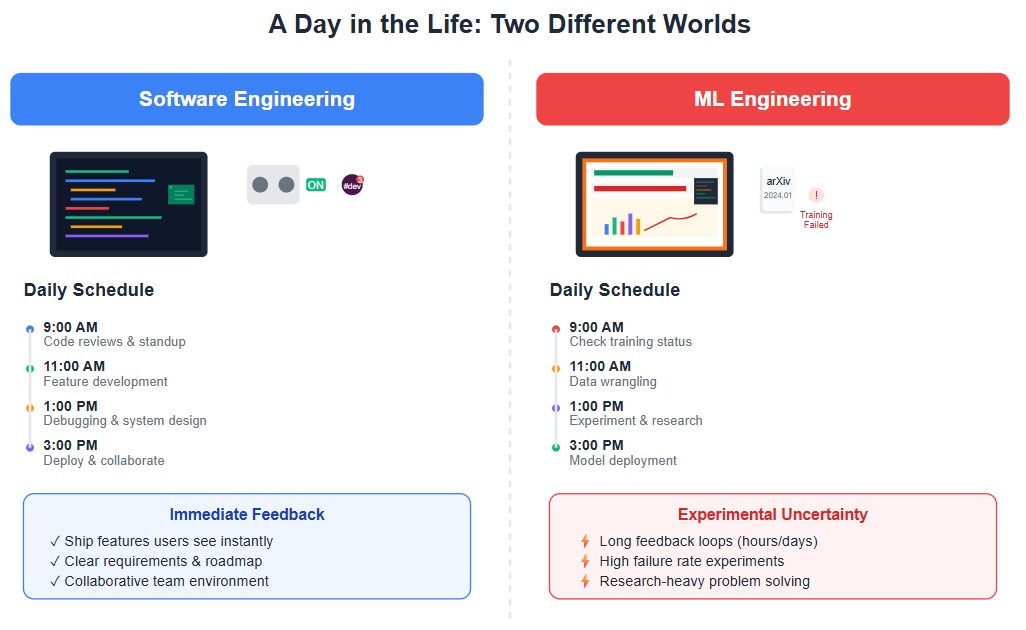
Software Engineering - Building Things People Use
Morning Reality: You grab coffee, check Slack for any production issues overnight, and dive into your sprint board. Your day revolves around shipping features that users will interact with within weeks or days.
What Your Typical Tuesday Looks Like:
9:00 AM - 10:30 AM: Code Reviews and Planning
- Review teammates' code (this happens constantly)
- Daily standup meeting (15 minutes of "what did you do yesterday, what are you doing today")
- Check if any bugs came in overnight
10:30 AM - 12:00 PM: Feature Development
- Writing actual code for user-facing features
- Building APIs, frontend components, or database schemas
- Immediate feedback loop - you can run your code and see it work
1:00 PM - 3:00 PM: Problem-Solving Mode
- Debugging why the login system broke
- System design discussions with teammates
- Figuring out how to make the app handle 10x more traffic
3:00 PM - 5:00 PM: Collaboration Heavy
- Working with product managers on requirements
- Cross-team meetings about integrations
- Code deployment and testing
Key Reality: You're building stuff people actually use. When you ship a feature, you can see it in the app or website. The feedback is immediate and tangible.
ML Engineering - Experimenting with Uncertainty
Morning Reality: You wake up hoping your model training didn't crash overnight (it probably did). Your day is about experimentation and dealing with data that never behaves how you expect.
What Your Typical Tuesday Looks Like:
9:00 AM - 10:30 AM: Data Detective Work
- Check if your model training finished (spoiler: it errored out at 3 AM)
- Investigating why your accuracy dropped 5% overnight
- Daily sync with data scientists about new datasets
10:30 AM - 12:00 PM: Data Wrangling Hell
- Cleaning messy data that's formatted differently than yesterday
- Writing scripts to process millions of records
- Debugging why your feature engineering pipeline broke
1:00 PM - 3:00 PM: Experimentation Mode
- Running A/B tests on different model architectures
- Tweaking hyperparameters and waiting for results
- Reading research papers to find new approaches
3:00 PM - 5:00 PM: Infrastructure and Monitoring
- Setting up model deployment pipelines
- Creating dashboards to monitor model performance
- Meetings about ML infrastructure with DevOps teams
Key Reality: You're constantly experimenting with uncertain outcomes. You might spend weeks on something that doesn't work. The feedback loop is longer, and success is measured in percentage point improvements.
The daily work experience is fundamentally different. Software engineering is like being a craftsperson building houses; you know what you're building, you use proven techniques, and people live in your finished product.
ML engineering is like being a researcher trying to cure cancer; you're working on hard problems with uncertain solutions, lots of experiments fail, but when you break through, the impact can be massive.
Pick the daily routine that energizes you, not just the one that pays more. You'll be doing this work 8+ hours a day for years - make sure you enjoy the process.
Who’s Hiring Who: Role Priorities Across Company Types
Let’s cut to the chase. Not all companies value ML and SWE the same way, and where you aim to work should shape your career decision. You don't want to spend two years learning transformers only to realize your dream company just wants backend APIs, or to walk into a panel without solid interview preparation
Here’s how hiring trends break down, based on what I’ve seen across job boards and my own network:
Big Tech & AI Research: ML Engineering's Gold Rush
The Reality: FAANG companies, OpenAI, DeepMind, and Anthropic are in an all-out bidding war for ML talent.
I know recruiters at these companies, and they're telling me the same thing: ML engineers are getting 30-50% salary premiums over traditional software engineers. Google just poached an ML engineer from Meta with a $450K package. That's not normal software engineering money.
Companies Going ML-Heavy:
- FAANG (Meta, Google, Apple, Amazon, Netflix): Building AI into every product
- AI Research Labs (OpenAI, Anthropic, DeepMind): Obviously ML-first
- AI Startups (Scale AI, Runway, ElevenLabs): 70-80% ML engineers
- Autonomous Vehicle Companies (Waymo, Tesla, Cruise): 90% ML roles
What They're Hiring For:
- Computer vision engineers for autonomous systems
- NLP engineers for conversational AI
- MLOps engineers for model deployment
- Research scientists for breakthrough algorithms
Salary Reality Check: $180K-$500K+ (with equity that could be life-changing)
Startups & SaaS: Software Engineering's Playground
The Reality: Most startups and SaaS companies are still 80-90% traditional software engineering roles. They need to build the product first, then make it smart later.
I've worked with dozens of startups, and here's what I see: they hire 10 software engineers for every 1 ML engineer. Even "AI-powered" startups spend most of their engineering budget on building the platform, not the AI.
Companies That Are SWE-Heavy:
- Early-stage startups: Building MVPs and core features
- SaaS platforms (Slack, Notion, Figma): Product development focused
- E-commerce companies: Infrastructure and user experience
- Fintech startups: Compliance and payment systems
What They're Hiring For:
- Full-stack developers for product features
- Backend engineers for scalable infrastructure
- DevOps engineers for deployment and monitoring
- Frontend engineers for user interfaces
Insider Truth: Startups talk about AI but hire for software engineering. They need working products before they need smart products.
The Hybrid Players: Where Both Win
Some companies are genuinely hiring both types of engineers at scale, and this is where the most interesting opportunities are.
Companies Hiring Both:
- Uber/Lyft: Software engineers for the app, ML engineers for routing
- Netflix: Software engineers for the platform, ML engineers for recommendations
- Shopify: Software engineers for e-commerce tools, ML engineers for optimization
- Stripe: Software engineers for payments, ML engineers for fraud detection
The Sweet Spot: Engineers who understand both domains become principal engineers and tech leads, making $300K-$400K+.
Agency & Consulting: Almost Pure Software Engineering
The Reality: Digital agencies, consulting firms, and custom software shops have 95% software engineering roles.
These companies build websites, mobile apps, and business software for clients. ML projects are rare and usually outsourced to specialists.
Examples:
- Accenture, Deloitte, IBM Consulting: Enterprise software development
- Digital agencies: Custom web and mobile applications
- Software consultancies: Business automation and tools
Why ML is Rare Here: Clients want proven, working software, not experimental AI features.
The companies you target should match your career path choice. Don't try to become an ML engineer to work at a traditional SaaS company - you'll be fighting an uphill battle.
You Know the Numbers, Now Own the Outcome
You've seen the data. SWE wins on stability and speed to hire. ML wins on upside and future-proofing. One gets you building fast. The other rewards deep specialization. Both are legit, but one likely fits your strengths, goals, and tolerance for risk better than the other. Your next move isn't about hype. It's about fit. Make it count.
Want more blunt, data-backed advice on navigating tech careers - minus the fluff? Subscribe below, and I’ll keep sending you straight talk that helps.
✉️ Get free system design pdf resource and interview tips weekly
✉️ Get free system design pdf resource and interview tips weekly

